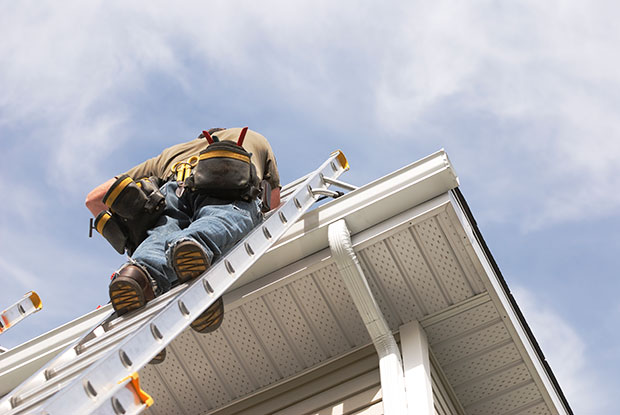Category: Insurance
Workers’ Comp Coverage: What an Illinois Business Should Know
Oswego, Montgomery and Morris businesses with one or more full- or part-time employees are required by the Illinois Workers’ Compensation Act to carry workers compensation insurance. The coverage provides medical treatment and wage replacement for workers who are injured or killed during their employment or as a result of it. It is estimated that just over 90% of Illinois employees are covered under the Act.
The insurance requirement applies to most persons, firms, public or private corporations, hospitals, public services, religious or charitable corporations, or associations that have any person in service or under contract for hire.

Workers’ comp is a vital and indispensable component of business operations in Illinois. If you are an employer in Oswego, Montgomery or Morris, this discussion will take a closer look at some of the things that are important to know about coverage.
Who Is Eligible for Workers’ Comp Coverage?
For an employee in Illinois (including Oswego, Montgomery and Morris) to qualify for workers’ compensation benefits, the following conditions must be met:
The employee must work for an employer whose business is covered by the Illinois Workers’ Compensation Act.
A covered injury or illness must arise from and in the course of employment for the covered business.
Proper oral or written notice of a covered accident or injury must be given to the employer and include the approximate date and location of the event (if known).
There is no waiting period for an employee’s workers’ compensation insurance to be in effect. An employee is covered by the Illinois Workers’ Compensation Act and must be insured beginning the moment of hiring.
Who Can Be Exempt from Workers’ Comp Coverage?
The following types of employees and employment are typically exempt from Illinois mandates for workers’ compensation coverage:
1) A sole proprietor or a partner or member of a limited liability company who elects not to provide and pay compensation for accidental injuries that are self-sustained.*
2) A corporate officer – defined as a bona fide president, vice president, secretary or treasurer – who individually elects to withdraw from coverage.*
(*Note that new law requires that employees who engage in extra-hazardous occupations must be covered by workers’ comp. This includes sole proprietors, business partners, limited-liability members and corporate officers. Aside from that condition, if a business owner or manager does not wish to be covered while providing workers’ comp for employees, the individual must notify the insurance carrier of the intent to opt out of coverage.)
3) A household or residence where a domestic worker is employed for less than 40 total hours per week for less than 13 weeks during a calendar year.
4) An agricultural enterprise, including aquaculture, that employs less than 400 working days of agricultural or aquaculture labor per quarter during the preceding calendar year, excluding working hours of the employer’s spouse and other members of his or her immediate family residing with him or her.
How Do New Employers Get Workers’ Comp Coverage?
Employers may either buy the insurance or obtain permission from the Illinois Workers’ Compensation Commission to self-insure. About 90% of Illinois employers purchase the insurance.
Workers’ compensation insurance in Illinois is sold in the private sector. With access to many different plans and carriers, Hometowne Insurance specializes in insurance for Oswego, Montgomery and Morris businesses that need operation-specific workers’ comp coverage.
Does Health or Occupational Disability Insurance Cover Workers’ Comp Cases?
It doesn’t. Other types of business insurance such as group health, occupational disability, general liability, disability or property insurance will not cover workers’ compensation liability. Only a workers’ compensation policy from an authorized carrier can insure these cases in Illinois.
Do Out-of-State Businesses Have to Carry Workers’ Comp for Illinois Employees?
Illinois law covers:
persons whose employment results in injury within Illinois
persons whose work is principally localized within Illinois
persons whose contract of hire was made in Illinois
If an out-of-state company conducts business with its employees in Illinois – i.e., it does any work at all in Illinois, even if all the workers reside in the company’s state – that company must have a workers’ comp policy that includes Illinois coverage for those workers.
If an employee from an out-of-state company is injured on the job in Illinois, that worker has the right to file a claim in Illinois. Only a workers’ compensation insurance policy that includes Illinois on its coverage is valid.
What Is the Penalty for Not Having Workers’ Comp Coverage in Illinois?
An employer that willfully fails to obtain workers’ comp insurance for employees will face a minimum fine of $10,000 and may be fined up to $500 for each day of noncompliance. Corporate officers can further be held liable if the company fails to pay the penalty.
Corporate officers who are found to have negligently failed to obtain insurance are guilty of a Class A misdemeanor. If they are found to have knowingly failed to obtain insurance, they are guilty of a Class 4 felony.
An employer that knowingly fails to obtain insurance loses its protections under the Illinois Workers’ Compensation Act. An employee who is injured during the time the employer was uninsured may sue the employer in civil court, where benefits are unlimited. During the trial the burden also will be upon the employer to prove it was not negligent.
The Illinois Workers’ Compensation Commission may issue a work-stop order on an employer that has been found to have knowingly failed to provide insurance. The employer must then stop all business operations until it provides proof of insurance.
Since 2006, the Commission has collected over $8 million in noncompliance fines. The fines are deposited into the Injured Workers’ Benefit Fund.
What Are Employee Compensation Benefits Under Illinois Worker’s Comp?
Illinois worker’s comp has four main categories:
Temporary Total Disability – the injured employee receives payments during the period in which the employee is temporarily unable to return to any work or is released to do light-duty work but the employer is unable to accommodate him or her.
Temporary Partial Disability – payments may be received during the period in which an injured employee is still healing, working light duty either part-time or full-time, and earning less than he or she would have during the pre-injury employment.
Permanent Partial Disability – benefits are paid only if the job-related injury results in the complete or partial loss of a part of the body; the complete or partial loss of use of a part of the body; or the partial loss of use of the body as a whole.
Permanent Total Disability – benefits are defined as either the permanent and complete loss of use of both hands, both arms, both feet, both legs, both eyes or any two such parts (e.g., one leg, one arm); or a complete disability that renders the employee permanently unable to do any kind of work for which there is a reasonably stable employment market.
Find the Right Coverage for Your Business
The importance of having workers’ comp insurance in Illinois is clear. Your independent Hometowne Insurance agent can inform and advise you about your options and help customize the coverage plan that is best for you. Contact us today to further discuss workers’ comp insurance for your business in Oswego, Montgomery or Morris.
Oswego/Montgomery: (630) 554-4040
Morris: (815) 942-1312
Email us
We also offer different options for workers’ comp coverage for businesses in nearby communities such as Batavia, Sugar Grove, Plano, Yorkville, Plainfield, Naperville and Aurora.
Insurance for Carpentry, Drywall and Painters
Different kinds of businesses in Oswego, Montgomery and Morris (IL) need different kinds of insurance according to how coverage will protect against an operation’s particular risks.
Carpentry, drywall and painter businesses are three professions that can require certain policies to suit their daily activities. In this discussion, we’ll provide a starting overview of insurance considerations for each.

Carpentry Insurance
Carpentry is a vital trade with diverse specializations, such as framing, finishing, remodeling, woodworking and new construction.
By its nature, the profession also carries the risk of accidents or damaged property. Whether you are an independent carpenter or a crew supervisor, guarding your work from liability is important to operating your business. Just one event involving medical bills or property damage, as well as potential legal fees, can bring operations to a halt.
The following are common insurance policies for carpentry businesses in Oswego, Montgomery and Morris:
Commercial General Liability. A must-have for carpenters, this coverage offers protection for third-party injuries and property damage, as well as liability related to completed work. For example, if a crew member ruptures a pipe during a job, rather than the company having to pay to repair it, general liability will help cover the cost.
Commercial Property. A property policy covers damages to your business structure and its contents as well as parts of the surrounding property. For example, if a severe storm batters your building, this insurance will help pay for any needed repairs.
Workers Compensation. Workers comp coverage is crucial if you employ a crew, and Illinois requires it. It protects your personnel from injuries or illnesses that they may sustain while working for you. For example, if a crew member falls from a ladder at a jobsite and breaks an ankle, workers comp will help pay for the medical bills, lost wages and any necessary rehabilitation.
Commercial Auto. Should you ever be in an accident while driving a company vehicle, this insurance will cover damages to vehicles involved in the accident, any resulting medical bills and any damaged equipment inside your vehicle. It is required in Illinois.
Having a local independent agency with access to many different carriers and types of coverage is the best way to get the right carpentry insurance according to your specific company factors.
Drywall Contractor Insurance
Installing drywall is a skill developed by proper training and experience. Even when a drywall contractor becomes highly proficient, however, exposure to risk remains.
Drywall contractor insurance covers those who install, remove or repair drywall, plasterboard, sheetrock and wallboard. It helps protect your business from the high costs of accidents, injuries, property damage and legal fees.
Common policies for drywall contractor insurance in Oswego, Montgomery and Morris include:
General Liability. As for carpentry insurance, general liability will protect you if a non-employee is injured or if you are liable for damage to another’s property. It will help pay for medical expenses, property damage and any legal fees and judgments. It covers you for any damages related to completed work as well.
Commercial Property. If you own or rent space for your drywall business, this insurance is worth considering. The policy covers your equipment, your inventory and, if you own it, your building. If you also own real estate where you store equipment, commercial property covers the structure and your equipment while it’s on the premises.
Commercial Auto. Mandatory in Illinois, commercial auto insurance helps pay for any medical expenses and property damage that may result from an event involving a business-owned vehicle. It covers collision repairs, medical expenses and rental reimbursement. It can also help with the cost of a tow if a vehicle needs one.
Workers Compensation. If you or an employee becomes sick or is injured while working with drywall, you will have financial protection for medical expenses, lost wages and other liabilities the business might have. This coverage is required in Illinois.
Other types of insurance for drywall contractors may include tools and equipment (often as an add-on to general liability), a surety bond for your business permit and license, and an umbrella policy for any liability limits above an existing policy’s maximum payout.
A local independent agency that can provide you with a wide range of insurance scenarios from different carriers is an excellent resource for the optimal drywall contractor insurance.
Painters Insurance
If you are a painter, you know the enduring importance of excellent work and a good reputation. Customers may often have many different choices for service, and you always aim to distinguish your business within your market.
You’re also familiar with some of the risks of your trade, such as a slip or a fall or even spilling paint on valued property. You’ve worked hard to build your business, and you can protect it with proper painters insurance.
Common insurance policies for carpentry businesses in Oswego, Montgomery and Morris include:
General Liability. This will cover any injury to a non-employee or damage to another’s property that may occur when you are working at or in customer’s home.
Worker’s Compensation. Required in Illinois, this will cover medical bills, lost wages and rehabilitation for an employee (yourself included) who becomes injured or ill while on the job.
Commercial Auto Insurance. This will protect the vehicles your business owns or leases to provide your service. Because you and personnel often drive to and from job sites, this provides peace of mind in knowing that you will be covered should there be an accident or property damage involving a company vehicle.
Carpentry, Drywall, Painters: Business Owners Policy
Carpentry, drywall and painting professionals with fewer than 100 employees and less than $5 million in annual revenue can also consider a Business Owners Policy (BOP). A BOP protects your main property and liability concerns under one umbrella, often with a lower premium than what you would pay carrying each type of coverage separately.
A BOP can often include insurance for business property; injury and property liability; business interruption; and medical payments. Your local independent agency can provide you with more details about the potential advantages of this type of commercial insurance.
Find the Right Coverage at the Right Cost for Your Business
Hometowne Insurance is an independent agency that can help you assess your company risk, define the right coverage and consider flexible ways you can acquire it. Contact us today to further discuss carpentry, drywall or painters insurance for your business in Oswego, Montgomery or Morris.
Oswego/Montgomery: (630) 554-4040
Morris: (815) 942-1312
Email us
We also offer different options of carpentry, drywall and painters insurance for businesses in nearby communities such as Plano, Plainfield, Batavia, Naperville, Aurora and Yorkville.
Insurance for HVAC, Plumbing and Electricians
Different businesses in Oswego, Montgomery and Morris (IL) will often have different concerns when it comes to protection from risk. In this discussion, we’ll briefly look at insurance for HVAC, plumbing and electricians here in the area.

Insurance for Oswego, Montgomery, Morris HVAC
HVAC contractors keep themselves busy installing, repairing and providing service for ventilation and airflow units such as furnaces and air conditioners, which might also include ductwork. This can expose them to risks such as:
- injury from welding or electrical wiring
- hazardous chemicals such as refrigerant
- business-premises injuries
- job-site accidents
- commercial-auto liability
- employee theft
Most HVAC service providers are hard-working professionals. At the same time, it’s just hard to predict a problem or liability – many are mistakes or accidents. With the right HVAC contractor insurance, you know you won’t have to pay out for an emergency situation from your own pocket.
Just a few common types of insurance for small and medium HVAC businesses are general liability, commercial property, commercial auto and workers’ compensation.
General liability protects the business from risks of bodily injury and property damage that may arise from daily operations (e.g. an employee damages a customer’s home while installing an air conditioner). This coverage can also include protection from liability related to advertising and completed operations.
Commercial property covers the business building’s structure and contents (e.g. a fallen tree during a storm smashes through a window, also damaging equipment inside).
Commercial auto insurance covers company vehicles that travel to job sites or carry supplies such as ducts and air conditioners (e.g. trucks, cargo vans, trailers).
Workers’ compensation insurance the business against liability concerning employee illness or injury (e.g. a technician suffers a serious back strain while moving a heavy box).
The cost of HVAC contractor insurance will vary depending on factors such as claims history, the type and amount of insurance, and your company’s size and location. An independent agent with access to a wide range of insurance scenarios from different carriers is an excellent resource for getting the coverage that is best for your business.
Insurance for Plumbing Oswego, Montgomery, Morris
Plumbers confront risks associated with installing, repairing and providing service for piping and fixtures for the conveyance of residential, commercial and municipal water. Just a few might include:
- dispute over scope of work and completion
- employee injury
- water damage
- property damage
- commercial-auto liability
- theft of tools or equipment
Similar to HVAC contractor insurance, common coverage for plumbers can be general liability, commercial property, commercial auto and workers’ compensation.
A plumber might also desire certain types of specialty insurance based on what the business requires. For example, because of risks associated with your specific operation, you might carry extended (“umbrella”) liability beyond what you already have. You might also add endorsements to ensure full replacement value of equipment or machinery.
If you have a smaller business with limited risk, you might consider a Business Owners’ Policy (BOP), which combines general liability, commercial property and business income insurance into one policy (income coverage provides revenue if your business runs into a stoppage because of a covered event, such as a fire).
Regardless of what coverage you carry, you’ll always want to closely review it for any gaps in protection for your business’s particular risks. Does it cover you for plumbing work on new construction? What about damage to existing pipes? An independent insurance specialist can be an excellent resource for ensuring your insurance is properly thorough.
Also like HVAC insurance, the cost of plumbing insurance will be influenced by factors such as claims history, type and amount of coverage, and company size and location.
Insurance for Electricians Oswego, Montgomery, Morris
If you’re an electrical contractor, you’re familiar with your profession’s distinctive risks, including some that might be obscure. For example, what if a staff member working on an electrical system causes an outage that wipes out part of a database? In business as in life, there are simply some things we can’t plan for.
Insurance for electricians helps protect against the factors that can lead to financial loss, such as property damage and personal injury. In this field as with HVAC and plumbing, basic coverage will often include general liability, commercial auto and workers comp.
Here too an electrician might benefit from a BOP if the business is smaller with low-to-moderate risk factors. With a BOP, you can bundle and customize the risk protection you need. An independent insurance agent without ties to a particular carrier can help you with the overall insurance plan that is best for your business.
Find the Right Cost and Coverage for You
Whether you are an HVAC, plumbing or electrical contractor, you want to approach each day with more focus on your work and less concern about your risk. Having the right insurance can be the difference between a growing business and a struggling one.
Hometowne Insurance is an independent agency that provides local contractors with the coverage possibilities for smart, thorough choices that also make financial sense. Contact us today to begin building the ideal insurance scenario for your business in Oswego, Montgomery or Morris.
Oswego/Montgomery: (630) 554-4040
Morris: (815) 942-1312
Email us
We also offer HVAC, plumbing and electrician insurance for businesses in nearby communities such as Aurora, Batavia, Yorkville, Plano and Plainfield.
Personal Watercraft Insurance
Being Midwesterners in Oswego, Montgomery and Morris (IL), when the sun and warmth of summer arrive, we want to make the most of it.
One way to celebrate summer is with recreation on a personal watercraft such as a Jet Ski or a WaveRunner. While fun and exciting, a watercraft can sometimes involve an injury or an accident. A watercraft is also an investment you may wish to protect.

Some homeowners policies might provide limited coverage for small boats. Most do not cover personal watercraft such as WaveRunners and Jet Skis. By covering you for damage, theft and liability, personal watercraft insurance can help you enjoy your watercraft even more by providing the risk protection you need.
What Is Personal Watercraft Insurance?
Watercraft insurance policies provide coverage for smaller water vehicles such as WaveRunners and Jet Skis; coverage for larger boats is also available. The size, type, value and age of your watercraft will determine the cost of coverage. Where you plan to operate the watercraft will factor in as well.
Depending on the coverage selected, a personal watercraft policy can insure you or someone you’ve allowed to operate your watercraft for incidents that result in:
- bodily injury to another person by your watercraft
- bodily injury to you caused by an uninsured watercraft operator
- negligence of another operator using your watercraft
- property damage such as that to another watercraft or a dock
- damage to your watercraft that requires you to repair or replace it
- liability for legal costs if you are sued because of an accident; personal watercraft insurance can also include liability for water sports such as waterskiing
- theft or vandalism of the watercraft
- towing of a watercraft if it breaks down or is involved in an accident on the water
Some policies may include certain exclusions. For example, the insurance might not cover operation of the watercraft when it is dark out. It might also not insure a watercraft that has been modified for greater performance and speed.
Personal Watercraft Insurance: Recovery Value
Personal watercraft insurance typically offers two primary types of financial recovery in the event of a total loss from an accident: replacement cost and agreed value.
Replacement cost coverage will pay for a new version of the same watercraft if it is damaged beyond repair within the first 36 months of its purchase. The new watercraft can include the same options and features that the original one did.
With agreed value coverage, you establish a value for the watercraft when you begin the policy. If the watercraft is a total loss after an accident, the insurer pays that set value.
Personal Watercraft Insurance: Other Features
Depending on the carrier, some personal watercraft insurance may include extra benefits such as special policy discounts or a disappearing deductible for incidents involving a total loss of the watercraft. Some carriers might also offer extended coverage for boats that are older than the usual age limits.
The key to finding these sometimes-hidden features is working with a local independent insurance agent with access to many different types of insurance carriers and coverages. A local independent agent will work for you – not for the carrier – in putting together the ideal insurance scenario for the personal watercraft you wish to protect.
Find the Right Cost and Coverage for You
Hometowne Insurance serves Oswego, Montgomery and Morris (IL) with the knowledge and resources that result in personalized insurance coverage and plans. Kawasaki, Yamaha, Sea-Doo – whatever your brand and model might be, we can provide you with the coverage comparisons that lead to greater peace of mind while you’re having a blast on the water.
Contact us today to discuss your personal watercraft insurance in Oswego, Montgomery or Morris.
Oswego/Montgomery: (630) 554-4040
Morris: (815) 942-1312
Email us
We also offer personal watercraft insurance options for nearby communities such as Aurora, Batavia, Yorkville, Plano, Plainfield and Naperville.
Why Use an Independent Insurance Agent?
Imagine you’re shopping for a new car in Oswego, Montgomery or Morris (IL). Two dealerships are side by side.
At the first dealership, the salesperson represents a particular make of car and is excited to tell you about all of the new SUVs and hatchbacks offered by that manufacturer. As a devotee of the brand, the salesperson is knowledgeable about the vehicles and all they can offer you.

At the second dealership, the salesperson represents multiple makes, models and sizes of auto. The salesperson isn’t beholden to one brand, and the inventory has many choices of cars according to what you may currently need.
If you were unsure about which car would be right for you, which dealership do you think might guide you to a better result?
The same question can be asked about insurance agencies. A wider range of coverage types and price points without allegiance to one carrier is but one reason why using an independent insurance agent can benefit you.
Let’s look at a few more reasons why using an independent agent in Oswego, Montgomery or Morris can be a great asset.
Why Use an Independent Agent: More Choices, Less Shopping and Maintenance
Most independent insurance agents represent from five to eight different insurance companies. When you need coverage, with an independent agent you will complete just one application to receive multiple quotes from competing carriers.
In other words, the independent agent does the searching and locating of coverage for you, and you get to choose which scenario suits you best. The independent agent works for you, not for an insurance brand.
It’s also the independent agent’s job to be well informed about the carriers and their products. The agent knows which insurance types and companies are a good fit for different people. With the agent’s market insight and knowledge, you can arrive at a greater potential value while saving your own time and effort.
You can usually consolidate your policies too. Instead of manage various statements and payments, you can keep your auto, home and life coverage in one customer profile with the independent agent. Multi-policy discounts might be available as well.
Why Use an Independent Agent: Licensed Professional
A licensed independent insurance agent is an established specialist who has been vetted for professional knowledge and conduct. The state of Illinois requires an agent to pass an exam to sell insurance. The agent must then periodically take and pass future exams based on continuing education requirements.
Why Use an Independent Agent: Dedicated Personal Service
This may be the biggest reason to work with an independent agent. Insurance is a product and a necessity, but acquiring and maintaining it requires good relationships.
An independent insurance agent is often a member of your community with a connection to your neighborhood. The agent understands both the advantages and the challenges of where you live and how insurance fits into those factors.
With an independent agent, you can get to know a professional person by name, and over time you can become even more familiar with each other as you communicate about your changing coverage requirements.
A good independent agent will review your coverage with you at intervals and keep you current with insurance-market conditions that might favor you.
Why Use an Independent Agent: More-Efficient Claims Processing
If it’s time to file a claim, your relationship with your independent agent can save you notable effort and time.
Should you need to submit a claim, you can report the event to your agent. The agent will notify the insurer and advise you during the claims process, including helping you fill out the proper forms.
In some cases, with your independent agent’s support, you might even resolve in just a few days a claim that would otherwise stretch into weeks or longer.
Connect with the Right Independent Agent for You
Hometowne Insurance is an independent insurance agent with deep roots in Oswego, Montgomery and Morris (IL). Representing 12 different insurance carriers, we provide you with access to many types of coverage as well as local personal service. We are committed to working for you, not for a specific insurance company.
Contact us today to further discuss how we can help you locate the right insurance based on the factors that matter to you.
Oswego/Montgomery: (630) 554-4040
Morris: (815) 942-1312
Email us
We are also an independent insurance agent for nearby communities such as Plano, Plainfield, Batavia, Geneva, Naperville and Aurora.
Understanding Umbrella Insurance
Many of us who live or work in Oswego, Montgomery or Morris (IL) carry both home and auto insurance. Those policies protect us up to set limits of personal liability.
In some cases, however, we might be faced with a liability situation that not is not fully covered by our primary homeowners or automobile policy.

For example, you are out of town in winter and your 20-year-old son has a party. The sidewalk and driveway are not sufficiently shoveled and salted, and someone slips and is badly injured. That person’s family decides to sue for medical and rehabilitation expenses.
The injured person will also miss substantial time from work, and the family sues for lost wages as well.
Your homeowners policy has $300,000 in liability protection. As an outcome of the family’s litigation, the insurance company and the injured person agree on a settlement of $325,000. You would then need to produce the $25,000 difference. Some people might have that amount saved, and some might not.
Still others might not be concerned about the expense because they carry an umbrella policy, which would defend the insured.
Umbrella Insurance: What It Is and How It Works
Umbrella insurance is coverage that extends financial protection for liability beyond what is specified in other primary policies, such as your auto and homeowners insurance.
Typically, before umbrella coverage pays out, the primary policy must disburse funds first. Using our slip-and-fall example, the primary homeowners insurance will pay the first $300,000 of liability costs. The umbrella coverage then will pay out the $25,000 balance.
Now let’s consider an example involving auto insurance. You’re involved in a collision in which the other driver’s car is totaled and the driver is injured, and it’s determined you’re at fault. The car must be replaced, and in addition to requiring medical care and rehabilitation, the other driver will not be able to work for some time.
In the end, the insurance company and the driver agree on $400,000 to cover costs. The primary policy will pay out for the car replacement, medical bills and lost wages up to $100,000 per person and $300,000 per claim. If you have umbrella insurance, it may pay the remaining $300,000 balance owed.
Do I Really Need Umbrella Insurance?
The preceding scenarios provide an initial idea of how valuable umbrella coverage can become. When you add up all expenses involved in a liability case, the total cost can often surpass a primary policy’s standard coverage.
Nearly all states maintain laws governing financial responsibility for drivers deemed responsible for bodily injury and property damage resulting from an accident. If that liability cannot be satisfied by existing coverage and available funds, personal assets can potentially be seized through litigation. If the defendant does not have seizable assets, damages may still have to be paid through future earnings.
With these things considered, it’s easy to see how umbrella insurance might benefit anyone. Plus, umbrella insurance often extends to other members of your residence, including a spouse, children and other relatives who live at the home and do not carry insurance in their own name.
If you own rental property, umbrella coverage offers protection beyond what your renter’s policy covers for liability as well.
Even more, unlike excess liability coverage, which covers only the same risks as the underlying policy, umbrella insurance broadens to include other hazards such as damages from libel or slander, which are excluded in a standard homeowners policy.
Umbrella insurance even extends to protect your liability risk anywhere else you might be in the world (with the exception of certain property you own under other countries’ laws).
What Does Umbrella Insurance Require?
Individual insurance companies establish the underlying coverage of their umbrella policies. The umbrella policy will specify the minimum liability amount you must first have to qualify for the extended coverage.
Many states mandate a minimum amount of liability coverage on an auto policy. However, that amount may be lower than the umbrella carrier’s required underlying amount before the umbrella coverage goes into effect. If this is the case, the liability amount on the primary policy would need to be raised to meet the umbrella’s minimum.
Some carriers might also specify that all property (home, auto, etc.) must be insured with them before umbrella coverage is available.
What Are Umbrella Insurance Limits and Costs?
Umbrella policies can range from $1 million to tens of millions in protection. Your limit would depend on your insurance budget and how much coverage you wish for.
Umbrella insurance has a superb cost-to-coverage ratio as well. The Insurance Information Institute currently estimates between $150 and $400 per year for a $1 million umbrella policy. This is a much greater value than carrying the same amount of extra liability on the main policy.
What Does Umbrella Insurance Not Cover?
These policies do not cover personal belongings, losses or damage related to operating a business (including home-based businesses), intentional or criminal acts or omissions, and written or oral contracts.
Note too that some agencies may not offer umbrella insurance that includes liability protection against uninsured/underinsured motorists as it relates to an auto insurance policy. This is significant when we look at it more closely.
Let’s say your spouse is carpooling your children and their friends to soccer practice. Suddenly, another motorist causes an accident with your spouse’s vehicle. It turns out the other driver’s auto insurance has low liability coverage (the driver is underinsured).
This would normally mean the other party’s policy will cap out quickly and may not cover everyone who was in your spouse’s vehicle. With an umbrella policy, some carriers will allow you to endorse your policy to include $1 million of insurance for uninsured/underinsured for automobile coverage.
When we transport our children, family members and others, it is important that we protect them as well, and umbrella insurance can help.
Find the Right Umbrella Insurance for You
Hometowne Insurance has access to many types of umbrella policies from different carriers, including coverage for uninsured/undersinsured motorists under the umbrella.
Contact us today to learn more about umbrella insurance and our versatile options for Oswego, Montgomery and Morris.
Oswego/Montgomery: (630) 554-4040
Morris: (815) 942-1312
Email us
We are also a main source of umbrella insurance for nearby communities such as Plano, Yorkville, Batavia, Geneva, Aurora and Plainfield.
Renters Insurance: You Don’t Have to Own to Have Coverage
Homeowners in Oswego, Montgomery and Morris (IL) are familiar with the importance of having homeowner’s insurance. Those who rent rather than own their residence likewise have access to coverage benefits that offer protection and peace of mind.
Also referred to as tenants insurance, renters insurance offers coverage similar to a homeowners policy except that it does not include the rented dwelling or structure aside from minor alterations to it the tenant might make. The building itself is covered by the landlord’s policy, which usually has limited or no protections for tenants.

Because a renters policy concerns personal loss and injury and not the full replacement of a dwelling or structure, the cost of coverage also is notably less.
Oswego, Montgomery, Morris (IL) Renters Insurance: Types
A renters policy typically includes three kinds of coverage:
- Liability to help protect you in the event you are held liable for injury to another person or damage to their property. For example, someone slips and hurts their back in your apartment, or you accidentally break someone’s house window.
- Personal property for protecting your belongings against “named perils” such as theft, fire, freezing, smoke and vandalism. Personal property coverage reimburses for the cost of repair or replacement of items such as furniture, appliances, instruments, electronics and clothing. (Valuables such as jewelry or a coin collection may have exclusions or limitations.)
This coverage can also sometimes extend to property beyond the rented residence (e.g. an expensive guitar is stolen from a car trunk).
- Additional living expenses for costs such as meals and temporary accommodations (e.g. hotel) in the event your rented space becomes uninhabitable, such as from fire or water damage.
Each coverage type will reimburse costs up to the maximum limits specified in the policy.
Oswego, Montgomery, Morris (IL) Renters Insurance: Payout Options
In establishing renters insurance, you can choose reimbursement according to either the actual cash value or the replacement cost.
Cash-value coverage pays the original cost of the item minus depreciation. Let’s say you have a pinball machine you bought three years ago for $1,700. One day, the game is badly damaged by a power surge during an electrical storm. The insurer will pay the calculated amount of $1,700 less three years of wear and tear.
With replacement-value coverage, the insurer would pay out what it would cost to buy a replacement pinball machine today.
In most cases, a renters policy will pay the covered loss after you’ve met the specified deductible, which is usually determined by your set premium. As with most forms of insurance, a higher premium usually has a lower deductible (and vice versa).
Oswego, Montgomery, Morris (IL) Renters Insurance: Amount Needed
You might wonder how much coverage you need for your rented living quarters. If you have very few possessions, or they are mostly used items of limited value, carrying just liability coverage or a small policy with a large deductible may be sufficient for you.
On the other hand, if your apartment includes high-end art, furniture and electronics, you’ll probably want to seek broader coverage.
To make the most of your renters insurance, you’ll want to keep a current list of your belongings as well as a photo or video record of them and store this documentation in a secure location. Also keep sales receipts for purchases greater than $50 with your records. Having this information readily available will be highly useful should you ever need to file a claim.
Find the Right Renters Coverage for You
Hometowne Insurance specializes in renters insurance for Oswego, Montgomery and Morris. We can answer your questions about which coverage is ideal for you based on your specific factors. We can also help you determine which coverage limits will best serve you.
Please feel free to call us whenever you’d like to learn more about the possibilities of renters insurance.
Oswego/Montgomery: (630) 554-4040
Morris: (815) 942-1312
Email us
We are also a main source of renters insurance for nearby communities such as Aurora, Plainfield, Naperville, Batavia, Geneva and Plano.
Contractors Insurance: Security for Your Valuable Service
If you own or manage a contractor business in an Illinois community such as Oswego, Yorkville, Morris or Minooka, you are familiar with the liability risks involved with your trade.
Some of the most common claims concerning contracting services in Illinois include employee injury, water damage, business interruption, and damage from defective work or falling objects.

Whether you’re serving residential or commercial markets, people will always need and depend on what you do. Carrying the proper contractors insurance provides the protection and peace of mind you need in serving your customers with excellence.
What Is Contractors Insurance?
Contractors insurance is a group of policies that cover the facets of a contractor’s particular work. Coverage might include insurance for:
- general liability for property damage or injury claims made by a third party against the contracting business
- builders risk for damage or theft involving the structure or materials on a job site, as well as business interruption or financial losses because of a project delay
- workers comp for protection from ramifications of employee illness, injury or death as a result of a work-related incident
- commercial/business auto for theft, damage or vandalism involving company vehicles
- umbrella and excess liability for coverage as a buffer against any claims that exceed another policy’s limits
- surety bond to guarantee your services will meet the terms of the contract
In some cases, a contractor might need just one particular type of policy. In others, a combination of one or two types might be necessary. The right insurance professionals will be able to package and customize the coverage you need at the most competitive cost.
Who Needs Contractor Insurance?
Many state and municipal laws (including in Illinois) require proper insurance to work on a project involving a contractor service. Regardless of whether they do, because of many contracting services’ inherent risks, carrying contractors insurance is always a good idea for industry professionals such as:
- drywall contractors
- HVAC contractors
- electrical contractors
- directional drill contractors
- carpentry contractors
- painting contractors
- landscape contractors
- plumbing contractors
- home building contractors
- concrete contractors
- asphalt contractors
- subcontractors
How Much Does Contractors Insurance Cost in Illinois?
The cost of carrying insurance in Illinois depends on different factors. For example, an independent contractor working alone will likely carry less insurance expense than a small service company with five employees. Conversely, a large corporate contractor working on a concert arena will pay much more.
Other factors of insurance costs can include project type and location, number of employees (for worker’s comp) and sales projections for the upcoming year.
Find the Right Contractors Insurance
Hometowne Insurance specializes in insurance for contractors in Illinois, including Oswego, Yorkville, Morris and Minooka. With our knowledge and resources, we can assist you in acquiring the best available coverage at the most competitive contractors insurance cost. We can also further inform you about different carriers as well as possible discounts.
Before you start looking for “contractors insurance near me” online, give us a call for the answers and attentive service you need.
Oswego: (630) 554-4040
Morris: (815) 942-1312
Email us
We are also a main source of contractors insurance for nearby Illinois communities such as Plainfield, Naperville, Aurora, Plano, Montgomery, Batavia and Geneva.
Classic Car Insurance: What Is It, and Should You Have It?
Owning a classic car is a joy for many auto enthusiasts in Oswego, Yorkville, Morris and Minooka. If you have one, you take great care of it so you can fully enjoy it. You likely keep it clean and sheltered and attend to it whenever needed.
Because collectible cars are also often valuable, having the right insurance for them is just as important as maintaining them.

Standard auto insurance factors a car’s age, miles and depreciation into its current worth. For this reason, standard policies usually will not protect a classic car for its total value in the event of damage or loss. Rather, it will pay out only the car’s replacement cost or its actual cash value (replacement cost minus depreciation), whichever is less.
With a collector car, age, custom features and the level of restoration are traits that add to its worth. The car’s present-day value can exceed its original price. Carrying classic car insurance will cover your collectible auto for an agreed (guaranteed) value confirmed by the underwriter or another resource such as an appraiser or a reputable price guide.
As an example, if you have a 1969 Mercury Cyclone CJ two-door fastback valued at $50,000 and it suffers a total loss in an accident, a collectible car insurance policy would pay out the full $50,000.
Plus, if the value of your collectible car continues to rise over time (e.g. you further restore it), you can renegotiate the covered value with your carrier.
Another advantage of the insurance is that because most classic cars are driven much less often than standard vehicles, premiums can be notably less than a standard policy’s, which would rate a classic car as a regular vehicle with regular rates.
Types of Classic Car Insurance
Although some insurance might classify vehicles differently, many classic car policies are similar. The following are some common coverage categories; note that defining ages for the types of cars can vary among carriers.
- Classic Car Insurance for restored autos 19–24 years old in good working condition with a greater value than other cars of the same make and modelyear
- Antique Car Insurance for autos at least 25 years old in good working original or original restored condition
- Modified Car Insurancefor autos that are altered from their original condition (e.g. engine, body, chassis, interior)
- Kit Cars and Replica Insurancefor representation automobiles that are at least 24 years old with separate manufactured components or that represent the assembled reproductions of any motor vehicle at least 25 years old
What Classic Car Insurance Covers
Insurance for collectible cars is like standard insurance in that it typically covers liability, medical payments and uninsured/underinsured motorists.
Aside from optional coverage such as collision and comprehensive, a classic car policy might also include insurance such as:
- roadside assistance including towing with a flatbed truck (required) to prevent wear and tear during transportation
- spare parts for items such as rare wheels and transmission or engine components
- specialized repair in the event a custom car is damaged
- no attendance required insurance for the car during display at a show where you’re not present
Find the Right Classic Car Coverage for You
Hometowne Insurance specializes in collectible car insurance for Oswego, Yorkville, Morris and Minooka. With our knowledge and resources, you can determine the coverage options and eligibility for your special collectible auto. We can also inform you about insurance with no mileage restrictions and make you aware of available discounts.
Add extra peace of mind to owning your collectible car – contact Hometowne today.
Oswego: (630) 554-4040
Morris: (815) 942-1312
Email us
We are also a main source of classic car insurance for nearby communities such as Plainfield, Naperville, Aurora, Plano, Montgomery, Batavia and Geneva.
Life Insurance Awareness Month: A Time to Reflect on What Matters
Life can be quick to remind us of its unpredictability: Daily news and events are easy examples of that. We all do our best to live our days peacefully and productively, but in the end we just never know when things might change for us and our loved ones.
September is Life Insurance Awareness Month. For those of us who live and work in Oswego and Morris (IL), it’s an opportunity to consider how those we care about will be provided for in the event we can no longer contribute.

Are Retirement Savings Enough?
Ideally, all of us will be able to work and earn until we retire, and we will develop sufficient retirement funds along the way. Upon our passing, those funds will remain an asset to our survivors.
But what if life’s circumstances don’t allow us to build a large nest egg? Will what we leave behind still support our loved ones?
This is where you can determine if life insurance is a desirable supplement to your retirement. A life insurance policy can make a big difference for survivors.
This can be all the more vital if you have young dependents, and the earlier you start your life insurance in Oswego or Morris, the better. For example, if you are 35 with children ages six and nine, your coverage will cost notably less than if you begin it at 50. You’ll also know you’ll be providing for your children should something happen to you when they cannot yet provide for themselves.
It’s often sensible for both parents to have life insurance as well. This can be particularly important if one stays at home with the kids and the survivor would be responsible for paying the mortgage, childcare costs and other debts or bills.
Life insurance can benefit children later in life as well. For example, if you have a child in middle school or high school, life insurance can help provide for college tuition, student loans or future milestones such as a wedding or a first house.
Let’s look at some other situations in which life insurance coverage can benefit those of us in Oswego and Morris.
People with partners, no dependents. Those with a significant other and no dependents may still wish for coverage to assist with payments such as the mortgage or other bills should one of the partners pass away. Life insurance can also help with funeral expenses for the deceased.
Plus, as we know, life can change. People can decide to get married or have children even if they didn’t think they would. Acquiring life insurance at lower rates earlier when you’re single and without dependents can make your coverage last longer for less.
Debt co-signer. If someone co-signed a loan with you (e.g. car, tuition, credit card), that person would still be responsible for the debt upon your passing. A life insurance death benefit could cover that obligation for the surviving co-signer.
Business owner. If you own a business in Oswego or Morris, life insurance can pay any current debts if you pass away. It can also assist heirs to the business with the estate taxes. If you have a business partner, it can help finance a buy-sell agreement that allows the partner to buy out your share.
Financial planning. If you have a high net worth, life insurance can assist heirs to your estate in paying estate or inheritance taxes. Even if you are not categorized as high net worth, you can still provide an inheritance amount through life insurance.
For investors who have reached the limits of other retirement plans, life insurance with a cash-value component can establish a separate source of retirement savings.
Life Insurance Oswego, Morris: Policy Types and Considerations
In acquiring life insurance, you have a wide range of policies to choose from based on your current situation and financial goals. If you wish to cover a specific period, such as until you retire or your mortgage is paid off, you might opt for a term policy.
If you would like coverage that builds a cash benefit through the years, you could discuss a whole life or universal life policy with your agent.
Main things to consider when looking for life insurance are the amount and cost of coverage you need. You might also inquire about any cost for policy adjustment or cancellation. Note too that the potential insurer may wish to collect information about your health when underwriting your policy.
Find Out More About the Right Life Insurance for You
Having life coverage in Oswego or Morris (IL) can give you great peace of mind in knowing you would still be caring for your loved ones even after you are gone. As an independent, full-service agency serving your community, Hometowne Insurance can help guide you to the coverage that’s best for you. Connect with a specialist today!
Oswego: (630) 554-4040
Morris: (815) 942-1312
Email us
We are also a main source of life insurance for nearby communities such as Plainfield, Naperville, Aurora, Montgomery, Batavia, Geneva and Yorkville.
